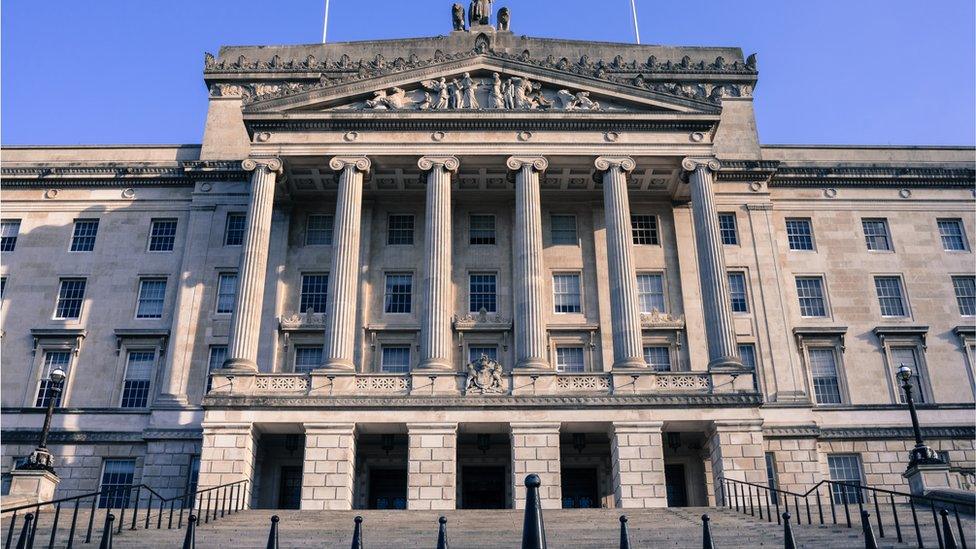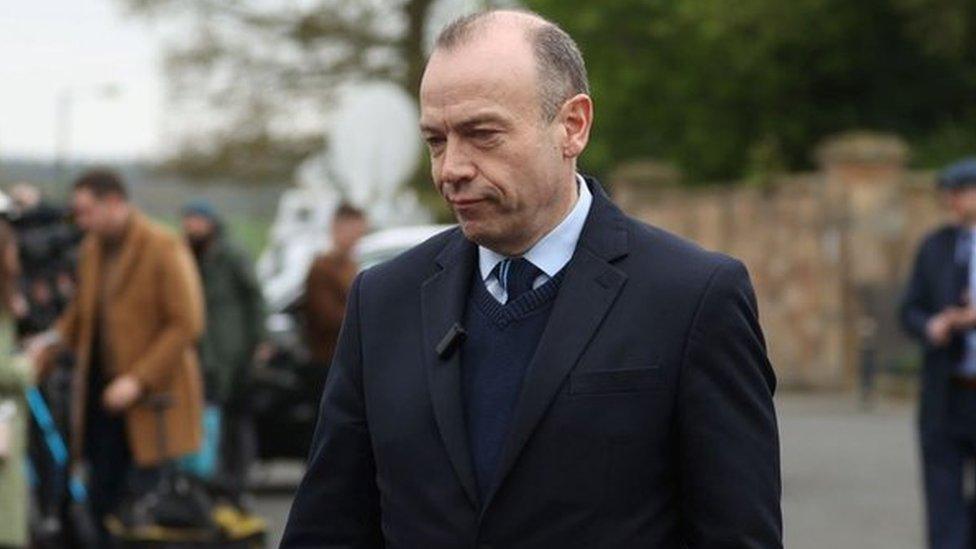Stormont budget: £800m needs to be found in cuts and charges - report
- Published
- comments

Stormont's new budget was published last week in the absence of locally-elected ministers
Stormont officials believe they will need to find £800m in cuts and revenue raising measures in the wake of last week's budget.
The figure is included in an assessment of the budget by the independent Northern Ireland Fiscal Council (NIFC).
It said Stormont's overall budget for day-to-day spending would fall by 3.3% in real terms in this financial year.
That is a tougher settlement than central government departments, which are facing a 0.7% real terms cut.
This is particularly stark for Northern Ireland education, which is facing a 2.7% cut while the schools budget for England is due to rise by 6.5%.
The NIFC said the relatively large cut for education may reflect that it was the largest overspender last year.
The council said Stormont's real overall budget cut would have been 5.5% if last year's overspend had to be paid back immediately.
The Treasury has agreed the £300m overspend can be repaid over two years rather than one.
The NIFC said that while this "avoids a very sharp real terms cut in departmental spending this year" it still means "tough decisions on spending and revenue raising".
It adds: "The NI Civil Service believes it they may need to find £800m this year given the pressures on its budgets.
"Revenue raising would likely be focused on fees and charges as the secretary of state has already set the regional rate for 2023- 24."

The council said that Stormont's real overall budget cut would have been 5.5% if last year's overspend had to be paid back immediately
The government has said the overspend can be cleared by using any additional in-year funding from the Treasury.
Should this not cover the full amount, the outstanding balance would be paid in 2024-25 by reallocating money from previously announced Northern Ireland funding packages.
The NIFC suggested that the money is most likely to be found in two pots - the 2020 'New Deal' funding to help businesses following Brexit and the 2014 Stormont House Agreement funding for institutions to address the legacy of the Troubles.
The former totalled £400m, although it is not clear how much has already been spent.
The latter totalled up to £150m over five years.
Public spending review
Separately, an independent review by the NIFC has concluded that public spending per head in Northern Ireland needs to be 24% higher than in England to deliver comparable public services.
The work uses population indicators such as age and long term illness to assess relative need.
It calculates that spending her head in Northern Ireland is currently 23% higher than England.
But it warns that under the current public spending model that premium will fall to 20% by the end of this decade.
As recently as 2018-19, the Northern Ireland premium was as high as 40% due to pots of one-off funding related to various political deals.
The NIFC says that the reduction in that premium has contributed to the current budget pressure on Northern Ireland departments.
Sir Robert Chote, chair of the NIFC, said "For many years NI departments benefited from funding-per-head that was not only well above spending in England but also above estimates of relative need."
He added that the funding premium has "fallen sharply to broadly in line with relative need - which has already proved very challenging - and it is set to drop even further".
He said this would increase the pressure on a restored Stormont Executive to deliver reform and improve efficiency, as well as confronting it with difficult choices over cutting services or raising more revenue.
Sir Robert added that another option would be to put a "funding floor" under the block grant in line with relative need, as happens in Wales.
That sort of arrangement would need to be negotiated and agreed with the UK government.
The Democratic Unionist Party has been tentatively floating the idea of an arrangement similar to the one that applies in Wales.
Related topics
- Published28 April 2023

- Published27 April 2023

- Published27 April 2023
